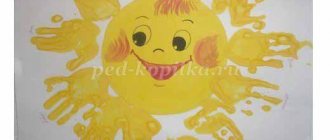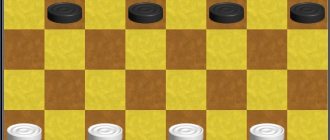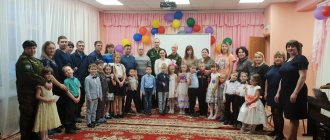Senior group. Senior preschool age. Children 5-6 years old
Scenario of the event “Mini Museum of Bread” in the senior speech therapy group Educator: Dear guests! Our group has a mini-museum “Bread”
.
Now the children will present exhibits that are in our museum. M. Gelya: “This is our mini-museum of “Bread”
.
There is a cake, Santa Claus’s bakery, a loaf of bread, a fairy tale theater “Spikelet”
, a plowman, a lark bird,…
An excursion with older children to the mini-museum "Cosmos" on the theme "The Sun is a Big Star" An excursion with older children on the theme "The Sun is a Big Star"
Goal: developing ideas about the Sun as a red-hot celestial body of a spherical shape, and its significance in the life of plants and animals.
The teacher meets the children at the mini-museum "Cosmos"
.
- Hello, I am…
project “Come to our museum”
MKDOU Sortavala MR RK DS No. 31
project “Come to our museum”
Organization of work with teachers and specialists of preschool educational institutions on the implementation of innovative technology “museum pedagogy”
Novikova Larisa Olegovna
Explanatory note
The teaching staff of the Skazka kindergarten purposefully and systematically works to improve the quality of education by updating its content; introduction of modern technologies that contribute to the creation of favorable conditions for self-realization of participants in the educational process of a preschool institution. The process of updating education, its design, launch and support will be the more effective the more new forms of work with the teaching staff are used. One of such effective forms is the introduction of museum technology into everyday practice. This technology has recently become very popular in the preschool education system. The main goal of museum pedagogy is to introduce the younger generation to museums and creative personal development. The rejection of modern children from domestic culture, from the socio-historical experience of generations is one of the serious problems of our time. Therefore, it is necessary to develop children’s understanding of cultural heritage and cultivate a caring attitude towards it from preschool age. It is very important to create an inspired environment around the child, to prepare the preschooler not so much informationally as emotionally for the perception of the historical past. The museum, the keeper of authentic evidence of the past, still remains a unique, indispensable guide to the world of history and culture. Undoubtedly, excursions to museums, especially family ones, have a beneficial effect on a child’s development. At the same time, it is noted that visiting museums by preschool children does not always bring the expected pedagogical effect. One of the founders of the Russian CE in the 20th century, Professor E.I. Tikheyeva, noted that it is much more useful for preschoolers when the museum itself comes to visit the child. In the latter case, one object or phenomenon is, as it were, snatched from general life and included in solving the pedagogical problems of the kindergarten. But the most important thing is that the mini-museum helps the kindergarten staff solve a wide range of pedagogical problems related to the education of children and family pedagogy: - the museum has a unique potential for social and educational work with children, helps children understand the language of things, comprehend their cultural significance and man-made nature, become indispensable assistants in studying the culture of their people, fostering patriotic feelings and creativity; -in an ordinary museum, a child is only a passive contemplator, but here he is a co-author, a creator of exhibitions. Museum pedagogy makes a child’s life more rich and interesting, raises his culture, develops his intellect, and gives him a new tool for understanding the world. An old saying goes: “Everything new is well forgotten old.” Currently, we can happily note the growing interest in the true history of our state and society as a whole.
The “Come to our Museum” project was developed by senior educator L.O. Novikova. for educators and specialists of the MKDOU Sortavala MR RK DS No. 31 “Fairy Tale”, with the aim of introducing innovative technology “museum pedagogy” into the pedagogical process. Aimed at supporting children's initiative, introducing children to the world of museums, creating conditions for the development of cognitive and creative abilities of preschool children, as well as the possibility of practical implementation of new pedagogical ideas and methods.
The relevance of the project was revealed from the analysis of monitoring of parents of pupils and teachers of preschool educational institutions:
·30% of parents of pupils have an idea of a museum as a place for collecting various interesting things and objects; 42% of parents believe that a museum is needed to come and look at it, 28% - to learn something new and interesting about the exhibits, about history, about people.
Thus, we can conclude that parents of children show interest in museums, but do not have the opportunity to interact with museum exhibits on their own, explore, communicate with interesting people
·Analysis of the survey showed that 60% of teachers are ready to create a mini-museum in their group, but do not have a clear idea of its role in the development of children.
There are contradictions
· between teachers’ understanding of the role of a mini-museum in the development of children’s cognitive activity and the insufficient level of professionalism of teachers in organizing cognitive, research and project activities;
· the need to develop cognitive activity and curiosity in children, including through the organization of a mini-museum, and the lack of methodological developments and a system for planning research activities;
· the need to use modern pedagogical technologies and the unpreparedness of individual teachers to improve their competence.
Problem. Lack of direction of work in preschool educational institutions on the development of cognitive and research activities in children through mini-museums.
Hypothesis. If we increase the competence of teachers in the field of modern technologies, in particular museum pedagogy, and involve them in active creative activities in organizing a mini-museum, this will allow us to systematize the work on cognitive and research activities in the field of cognitive, artistic, aesthetic, and speech development.
Project Information Card
| Full name of the project | "Come to our museum" |
| Author of the project | Novikova L.O., senior teacher of the MKDOU Sortavala MR RK DS No. 31 “Fairy Tale” |
| Project Implementers | Educators and specialists, parents, children of the MKDOU Sortavala MR RK DS No. 31 “Fairy Tale” |
| Project type | Creative, educational |
| Project type | Medium term, 4 months |
| Objective of the project | Creating a system of work to develop children's cognitive interest in art in general through the use of museum pedagogy as an innovative pedagogical technology. |
| Project objectives | 1. Create conditions for increasing the competence of teachers in the field of museum pedagogy and organizing a mini-museum in preschool educational institutions; 2. Stimulate self-education of teachers. 3. Create conditions for the development of children’s cognitive activity through joint cognitive and research activities in a mini-museum, 4. Contribute to the formation of cognitive interest and curiosity in preschoolers by introducing “museum pedagogy” technology into the work of teachers 5. Contribute to the education of culture and artistic taste of students. 6. Get parents interested in creating a mini-museum, 7. Create conditions for the active participation of parents in cognitive, productive and creative activities with their children. |
| Brief summary of the project | Organization and planning of methodological work with teachers on the development of innovative technology “museum pedagogy”; creation of a system of work with children and parents in this area. Organization and conduct of pedagogical events aimed at creating psycho-emotional comfort and creative exploration among teachers of preschool educational institutions. |
| Location | Municipal state preschool educational institution of the municipal district of the Republic of Karelia Kindergarten No. 31 “Fairy Tale” Sortavala, Pobeda, 4 |
| Dates | October, November, December 2021, January 2021 |
| Number of project participants | 160 people (of which 16 are teachers) |
| Children's age | from 2 to 7 years |
| Form of conduct | Pedagogical consultations for teachers, workshop, exchange of experience, review competition, pedagogical council, regulated and non-regulated activities during the day |
| Practical significance of the project | Generalization and dissemination of experience on the topic: “Museum pedagogy as an innovative pedagogical technology.” |
| Project products | Mini-museums in age groups and specialists’ offices; presentation of a mini-museum; mini-museum passport, special signs for mini-museum visitors, exhibition of children's creative works, didactic games for mini-museums on the theme of the museum. |
| Expected results | With teachers:
With kids: 1. Increasing children's knowledge about museums 2. Increasing the cognitive activity of children, developing curiosity. 3. Development of children's creativity through the creation of creative works (crafts, drawings). 4. Active participation of parents in the creation and design of mini-museums, joint cognitive and creative activities with the child. 5. Involving parents in the educational activities of preschool educational institutions, strengthening parents’ interest in the creative development of children and cooperation with the kindergarten. |
| Project Implementation Plan | Preliminary work: Questioning of parents and teachers Accumulation of information and materials on organizing work with teachers on museum pedagogy. Preparation of methodological recommendations for organizing museum activities in different age groups. Creation of conditions for organizing exhibitions. Project implementation: Planning and organization of methodological work with teachers using the “museum pedagogy” technology by age group. Organization of the review-competition “The best mini-museum in a preschool educational institution” (for teachers) (creation of a mini-museum in age groups, specialists’ offices). Organization of a workshop “Didactic games for mini-museums” (for group teachers) Summing up the project implementation: Final survey of parents and teachers Creation of mini-museums in age groups and specialists’ offices Development of a museum passport, production of special signs for museum visitors. Development of outlines of scenarios for conducting museum activities. Pedagogical Council “Results of the implementation of the project “Come to our Museum” Experience dissemination practice: Dissemination of experience on the topic: “Museum pedagogy as an innovative pedagogical technology” on:
|
Planning methodological work
| date | Event | Form of conduct | Target |
| 04.10. 2017 | Consultation for teachers “Where does a museum begin?” | Teaching hour. Presentation | Formation of interest among teachers in museum pedagogy; to the perception of studying material on this topic |
| 11.10.2017 | Consultation for teachers “How to choose a theme for creating a museum” | Teaching hour. Presentation | Motivation for the inclusion of teachers in the study of innovative technology “museum pedagogy” |
| 18.10.2017 | Review of methodological literature on the project topic | Teaching hour. | Discuss all the latest pedagogical literature on this topic |
| 25.10.2017 | Consultation for teachers “The purpose and objectives of the mini-museum” | Teaching hour. | Studying material on setting the right goal for a mini-museum and solving various tasks to achieve it |
| 1.11.2017 | Consultation for teachers “Technologies of museum pedagogy in preschool educational institutions” | Teaching hour. Presentation | Study of innovative technology |
| 08.11.2017 | Consultation for teachers “Using a mini-museum in working with children” | Teaching hour. | Forming the ability of teachers to use new technology in working with children. Studying the material. |
| 15.11.2017 | Consultation for teachers “Using a mini-museum in working with parents” | Teaching hour. | Forming the ability of teachers to use new technology in working with parents. Studying the material. |
| 22.11.2017 | Consultation for teachers "Games for a mini-museum" | Teaching hour. Presentation | Forming interest among teachers in museum pedagogy, studying material on organizing gaming activities. |
| 29.11.2017 | Consultation for teachers "Rules of conduct in the museum" | Teaching hour. Presentation | Development of creative abilities of teachers and children |
| 06.12.2017 | Consultation for teachers "Child Tour Guide" | Teaching hour. | Studying material on working with children |
| 20.12.2017 | "Festival of didactic games for mini-museums" | Workshop | To summarize the experience of teachers using the “museum pedagogy” technology, to develop the creative potential of educators. |
| 24.01.2018 | “The best mini-museum in a preschool educational institution” | Review competition for preschool teachers | Identifying the best creative work on organizing a mini-museum in an institution |
| 31.01.2018 | Results of the project “Come to our museum” | Pedagogical Council at the preschool educational institution | Analysis of creative and organizational work on the project, identifying strengths and weaknesses. |
| Dissemination of work experience on the topic: “Museum pedagogy as an innovative pedagogical technology” | |||
| 14.02.2018 | Methodological association of speech therapists | MO of speech therapist teachers at MKDOU No. 7 “Romashka” | Dissemination of teaching experience. Report by speech therapist E.N. Gridneva on the topic “The role of a mini-museum in working with parents of special children” |
| 15.02.2018 | "Open Day" | Organization of an Open Day with the invitation of teachers from secondary schools No. 1, 4, 6. | Dissemination of teaching experience. Excursion work for age groups and rooms in which exhibitions are located. |
| 26.02.2018-27.02.2018 | "Come to our museum" | Event for children and teachers of neighboring kindergartens (“Romashka”, “Rodnichok”), as well as secondary schools | Dissemination of teaching experience. Excursion work for age groups and rooms in which exhibitions are located; |
| February 2021 | Publication on the website of the senior teacher and MKDOU No. 31 | Publication | Dissemination of teaching experience. Improving the image of the institution |
Appendix No. 1
1. Presentation “Where does a museum begin”
2. Presentation “How to choose a theme for a mini-museum”
3. Presentation “Goal and objectives of the mini-museum”
4. Consultation for teachers “Technologies of museum pedagogy in preschool educational institutions”
5. Consultation for teachers “Rules of conduct in the museum”
6. Summary of the seminar-workshop “Games for a mini-museum”
7. Regulations on holding a review-competition “The Best Mini-Museum of a Preschool Educational Institution”
8. Questionnaires for parents and teachers
9. Presentation “Results of the project “Come to our Museum”
Bibliography
1. Vanslova E. G. Museum pedagogy in the 21st century. // World of the Museum. - 2005. - No. 3.
2. Zakharova // Child in kindergarten. - 2004. - No. 5.
3. Knyazeva O. L., Makhaneva M. D. Introducing children to the origins of Russian folk culture. Program: Educational and methodological manual. St. Petersburg: Childhood-Press, 1998.
4. Museum pedagogy. From the experience of methodological work. / Ed. A. N. Morozova, O. V. Melnikova. - M.: Sphere shopping center, 2006
5. Stolyarov B. A. Museum pedagogy. History, theory, practice. M.:
6. N. Ryzhova, L. Loginova, A. Danyukova “Mini-museum in kindergarten” - LINK-PRESS. 2008.


